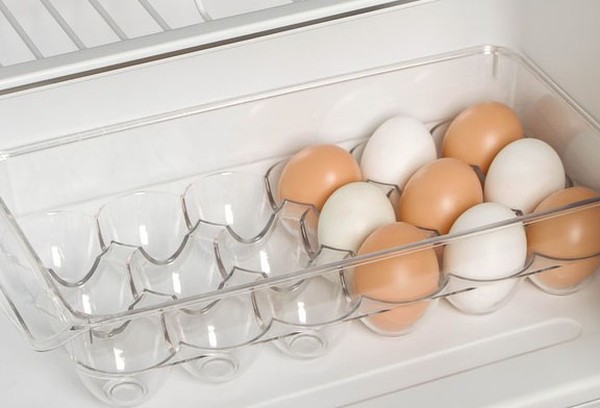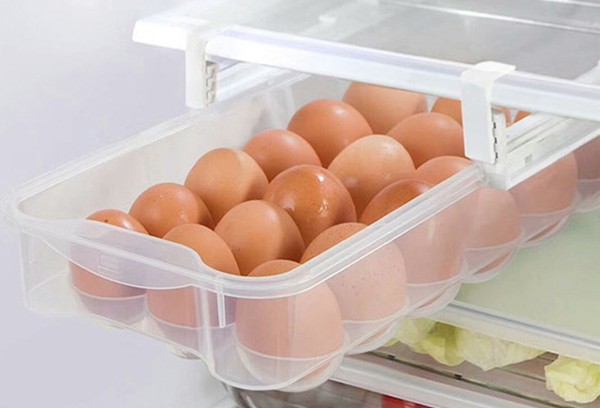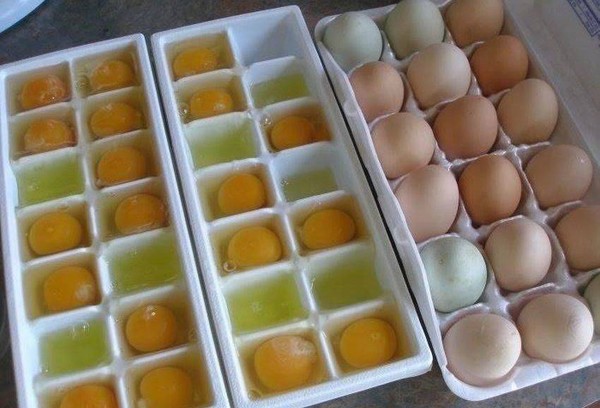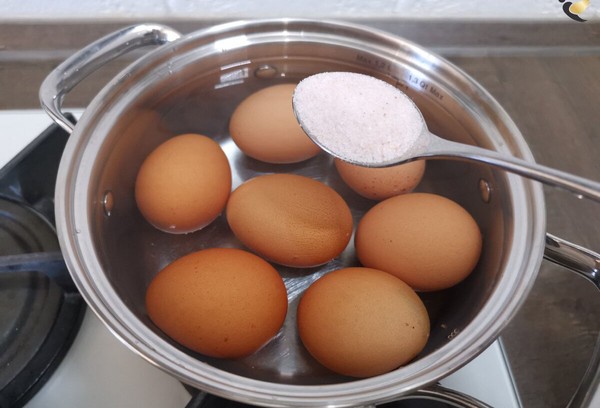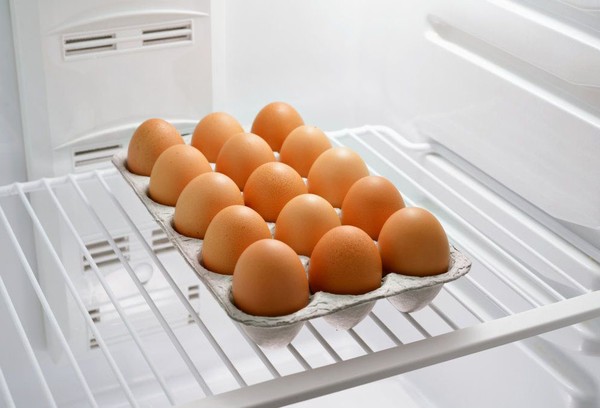Chicken egg storage temperature
Content:
What temperature to store eggs at is important to maintain their freshness. The shelf life of the product directly depends on environmental conditions. For example, chicken eggs sit on supermarket shelves for quite a long time at temperatures above +20° C. Whereas, according to regulations, it is desirable to maintain a lower storage temperature. This is why most buyers put the eggs in the refrigerator immediately after they bring them home.
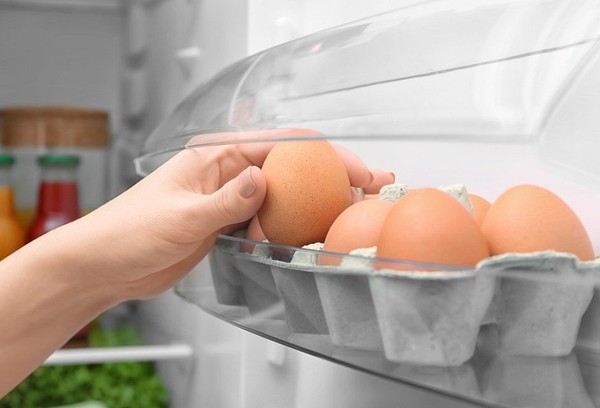
Temperature and shelf life according to GOST and SanPin
Everything related to products sold in stores is regulated by the state. The regulations set out quality standards and shelf life. For food products, the main regulatory documents are GOST and SanPiN. You can view them on the Rospotrebnadzor website.
Chicken eggs for food can be dietary or table. A product falls into the category of dietary products if no more than 7 days have passed since leaving the poultry farm. When this period expires, the testicles move into the table category. Such products are stored for 20 days, the period is counted from the moment of sorting. For eggs stored in the refrigerator, the storage time increases to 60 days.
SanPiN indicates that dietary eggs should be stored at temperatures from 0° C to +20° C. For the table category, the temperature range is slightly wider: from -2° C to +20° C. At the same time, sanitary authorities prohibit the sale of products without labeling and identification quality, in dirty containers, expired and showing signs of spoilage.
Storing raw eggs
Most often, chicken eggs are stored raw. They are bought with a reserve so as not to run to the store at the most inopportune moment. Shelf life is directly related to the selected temperature regime.
At room temperature
At room temperature, fresh chicken eggs with their shells intact can be stored for up to 25 days. The room where the product is stored should not be warmer than +20° C. The first 7 days of storage are considered dietary eggs.
If the eggs are freed from their hard shell, for example, for adding to some dish during cooking, they can be kept at room temperature for no more than 20-30 minutes. After this period, bacteria begin to multiply intensively in the yolk and white.
In a refrigerator
The temperature for storing chicken eggs in the refrigerator should be from 0° C to +6° C. Typically, this is the temperature regime maintained in the refrigerator compartment. The shelf life of the product in this case will be at least 25 days. The first 7 days of storage are considered to be the most useful testicles. If the products were stored in the refrigerator at the stage of being in the store and they were also placed in the cold at home, the shelf life is extended to 2 months.
Eggs must be stored with their shells intact. A cracked shell contributes to accelerated spoilage of the product.There is no need to wash the testicles first, since water washes away the protective film, which is why pathogenic microorganisms can penetrate through the pores. It is advisable to store products in their original packaging.
If you purchased homemade eggs, place them in a cardboard box. It is better to put the eggs on the bottom shelf. You should not place them on the refrigerator door, which can cause temperature changes when opened frequently.
In the freezer
Storing raw eggs in the freezer has its own characteristics. If you place them in the freezer whole, the shells will burst when frozen due to the expansion of the liquid contents. Therefore, eggs without shells are usually frozen by separating the whites from the yolks. Ziploc bags, plastic containers, and baking dishes are suitable as storage containers.
Containers must be filled with a small reserve. For maximum product safety, it is advisable to maintain the temperature in the freezer at -15° C. Before freezing, you can add a little salt or sugar to the eggs, depending on how you plan to use them in the future. Both substances help maintain the texture of the product after defrosting.
The egg mixture must be defrosted naturally, without using a microwave or hot water. Even better is smooth defrosting, when the product from the freezer is first transferred to the refrigerator. The product can then be used to prepare omelettes, casseroles, and baked goods.
Storing boiled eggs
Boiled eggs have a shorter shelf life than raw eggs, but still, if stored properly, it will be possible to extend their shelf life for some time. The freshness of the product, as well as in its raw form, depends on storage conditions. The date of marking also matters. The fresher the product, the longer it will last.
It is important to cook the eggs correctly. Before cooking, take them out of the refrigerator in advance and allow them to warm up. Otherwise, due to temperature changes, the shell may crack in hot water. It is better to eat cracked eggs without leaving them for too long. Do not cook the eggs for more than 8 minutes, otherwise the whites will become too dense. This time is enough to cook hard-boiled eggs.
At room temperature
Room temperature is not conducive to long-term preservation of boiled eggs. The method of preparation also matters. If the eggs are hard-boiled, they will last up to 3 days without loss of quality. Soft-boiled eggs will keep for about a day. In both cases, the shell must be preserved. When cleaned, the testicles will last no longer than 10-12 hours. It should be taken into account that the temperature in the room should not exceed + 20° C. In a warmer room, the time is reduced by 2-3 times.
In a refrigerator
It is better to keep boiled eggs in their shells in the refrigerator, so they will last longer. For storage, a standard temperature regime is suitable - from 0°C to +6°C. If there are no cracks in the shell, the product will last up to 20 days. If the shell is cracked, the shelf life is reduced to 3 days.
In the freezer
Boiled eggs can be frozen, but not whole eggs. Only yolks are suitable for freezing. Frozen protein loses its structure, the product’s taste deteriorates, and a specific smell appears. Frozen yolks are stored at -15°C for six months. It is more convenient to use thick plastic bags as containers.
You need to arrange the yolks so that they do not touch each other. Vacuum packaging will provide the most reliable storage. Defrost the yolks by transferring them to the refrigerator.In cooking, such a semi-finished product is used to prepare sauces, appetizers, and soups.
How to extend shelf life
The product is preserved differently under different conditions. A set of small life hacks will extend the shelf life of chicken eggs:
- Raw eggs will be stored longer if they are coated with vegetable oil or paraffin on top. The film formed on the shell will prevent the product from drying out and bacteria from penetrating inside.
- It does not matter in what form the eggs are sent for storage, raw or boiled. The main thing is to provide them with free placement with a small interval.
- Before putting boiled eggs in the refrigerator, they are first cooled in cold water and wiped dry. Excess moisture promotes the proliferation of microorganisms.
- If you put the eggs in the vegetable compartment, they will last longer, since in a closed box the temperature practically does not change.
- It is believed that eggs with brown shells remain fresh longer compared to white ones, although experts do not confirm this.
It is advisable to stick a sticker with the date of packaging on the tray with eggs. In this case, you won’t have to remember exactly when the product was put away for storage.
Eggs are a nutritious and valuable product, but only if the expiration dates are met. For storage, it is better to select the freshest possible products. The shell must not be cracked or otherwise damaged. You can store eggs in the refrigerator, freezer, or even at room temperature. After storage, the product should not show signs of deterioration. You can tell if the testicles are stale by their appearance and smell.
